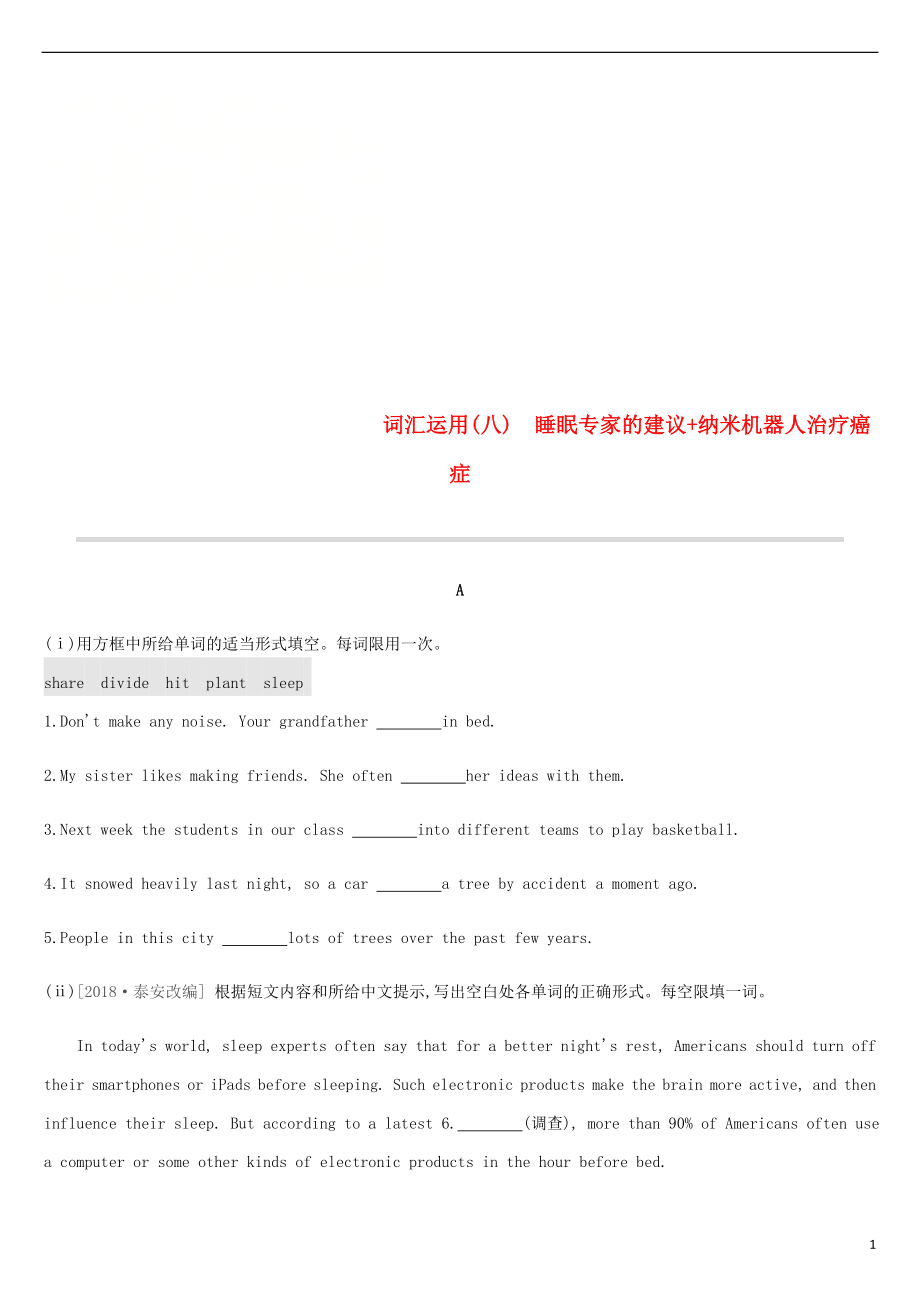《浙江省2019屆中考英語總復(fù)習(xí) 第三篇 書面表達(dá)篇 詞匯運(yùn)用08 睡眠專家的建議+納米機(jī)器人治療癌癥試題 (新版)外研版》由會員分享���,可在線閱讀,更多相關(guān)《浙江省2019屆中考英語總復(fù)習(xí) 第三篇 書面表達(dá)篇 詞匯運(yùn)用08 睡眠專家的建議+納米機(jī)器人治療癌癥試題 (新版)外研版(3頁珍藏版)》請在裝配圖網(wǎng)上搜索����。
1、
詞匯運(yùn)用(八) 睡眠專家的建議+納米機(jī)器人治療癌癥
A
(ⅰ)用方框中所給單詞的適當(dāng)形式填空���。每詞限用一次���。
share divide hit plant sleep
1.Don't make any noise. Your grandfather in bed.?
2.My sister likes making friends. She often her ideas with them.?
3.Next week the students in our class into different teams to play basketball
2、.?
4.It snowed heavily last night, so a car a tree by accident a moment ago.?
5.People in this city lots of trees over the past few years.?
(ⅱ)[2018·泰安改編] 根據(jù)短文內(nèi)容和所給中文提示,寫出空白處各單詞的正確形式����。每空限填一詞。
In today's world, sleep experts often say that for a better night's rest, Americans should turn
3、 off their smartphones or iPads before sleeping. Such electronic products make the brain more active, and then influence their sleep. But according to a latest 6. (調(diào)查), more than 90% of Americans often use a computer or some other kinds of electronic products in the hour before bed.?
Researche
4��、rs find that man-made light from some electronic products at night may reduce the 7. (大腦)chemicals that help sleep. In the study, the researchers let volunteers read, play games and watch movies on a screen for different time while 8. (測量) how much light their eyes received. They found that tw
5��、o hours of sitting before a 9. (明亮的)screen at night reduced the sleep chemical levels by about 22%.?
Then the researchers studied the 10. (學(xué)院)students who often used computers at night. They got the similar 11. (結(jié)果). And researchers say that may not only 12. (引起) sleeplessness, but al
6���、so raise the risk of obesity(肥胖癥), diabetes(糖尿病) and other 13. (疾病).?
To be on the safe side, the researchers 14. (建議) that we should use computers less than before, or turn down our screens as much as 15. (可能)before sleeping.?
B
(ⅰ)用方框中所給單詞的適當(dāng)形式填空。每詞限用一次���。
teach two write boy against
7���、
1.The rain began to beat heavily the window of my room. ?
2.Think about it. Maybe you'll change your mind. ?
3.Peter was a letter to his friend at eight o'clock last night.?
4.Look! There are a couple of waiting for you at the door.?
5.She has us since I came to this school.
8、?
(ⅱ)[2018·達(dá)州改編] 根據(jù)短文內(nèi)容和所給中文提示,寫出空白處各單詞的正確形式�。每空限填一詞。
In 2050, a small cloud floats(漂浮) through the air in a hospital operating room. In the room a patient, suffering from cancer, 6. (躺) on a table. The cloud surrounds(包圍) the patient, covering her body and 7. (填充) her lungs(肺).The cloud is
9�、 not smoke or steam(水汽). It is made of millions of microscopic robots 8. (叫作) nano-robots(納米機(jī)器人).These tiny robots 9. (移動) from cell(細(xì)胞) to cell in the patient's body, destroying the cancer cells.?
Fighting cancer with nano-robots is only a(n)10. (想法) today, but scientists say that it wo
10、uld be possible in the future. Using nano-robots for good 11. (目的) such as fighting disease or repairing the environment may be the solution(解決辦法) to many of today's problems.?
However, nano-robots could be a bad 12. (冒險) as well. Since nano-robots are so tiny, they will have to work in lar
11����、ge teams of many thousands to many millions. For this 13. (原因), nano-robots will have to be programmed to build themselves. Scientists will not have the ability to build millions of nano-robots one by one.?
This ability to reproduce(復(fù)制) is making some scientists 14. (擔(dān)心的). What if something
12、 goes wrong in the programming? Quite a lot of crazy nano-robots would be far more dangerous than any disease. Some people think that if they get out of 15. (控制), nano-robots could destroy the Earth.?
What should we done? Should we continue researching nano-robots or should we search for other
13�、 methods? This is one of the many difficult decisions that we have to make in the future.
參考答案
A (ⅰ)1.is sleeping 2.shares 3.will be divided 4.hit 5.have planted
(ⅱ)6.survey 7.brain 8.measuring 9.bright 10.college
11.results 12.cause 13.diseases/illnesses 14.suggest 15.possible
B (ⅰ)1.against 2.twice 3.writing 4.boys 5.taught
(ⅱ)6.lies 7.filling 8.called 9.move 10.idea
11.purposes 12.risk 13.reason 14.worried 15.control
3
 浙江省2019屆中考英語總復(fù)習(xí) 第三篇 書面表達(dá)篇 詞匯運(yùn)用08 睡眠專家的建議+納米機(jī)器人治療癌癥試題 (新版)外研版
浙江省2019屆中考英語總復(fù)習(xí) 第三篇 書面表達(dá)篇 詞匯運(yùn)用08 睡眠專家的建議+納米機(jī)器人治療癌癥試題 (新版)外研版

